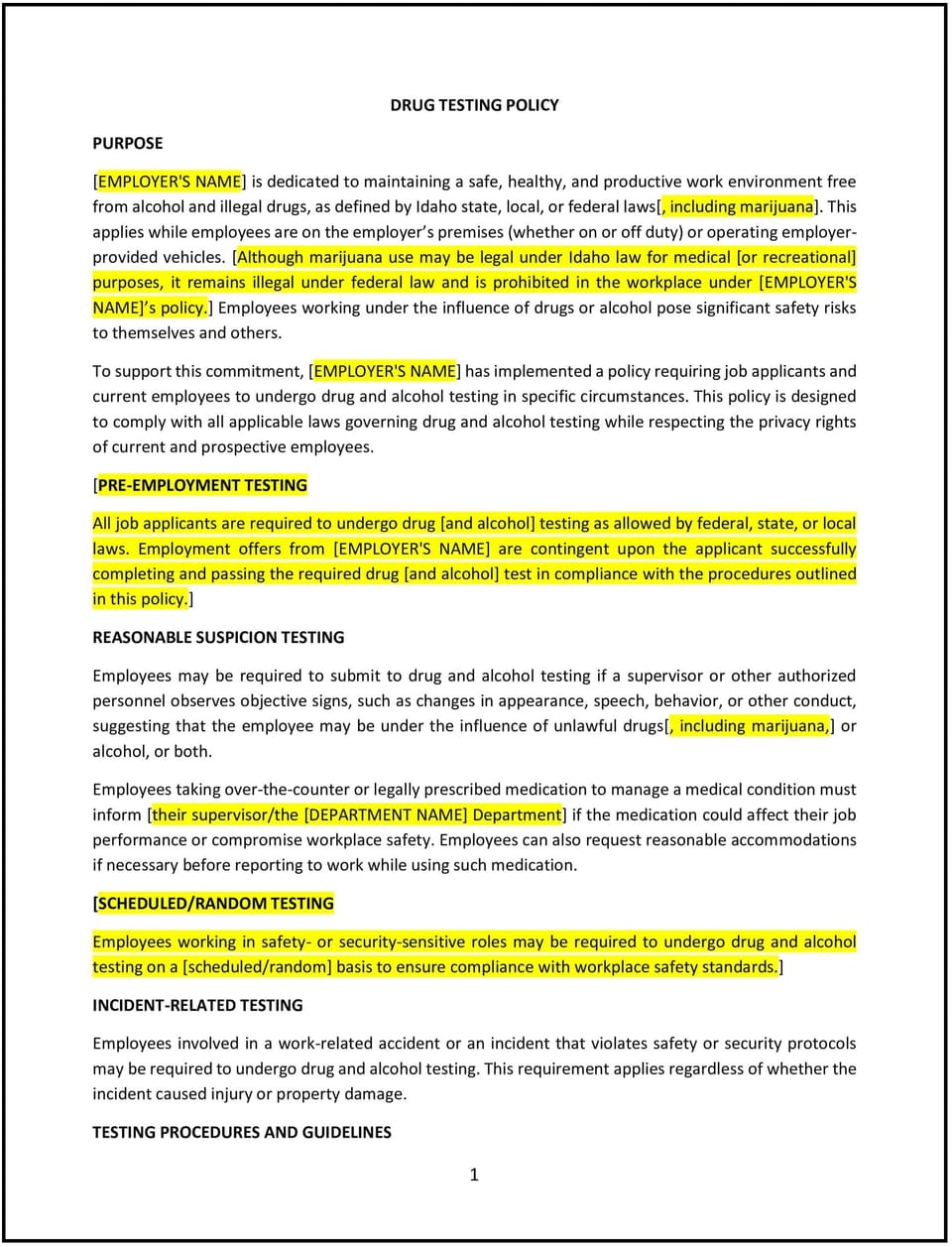Drug testing policy (Idaho): Free template

Drug testing policy (Idaho)
A drug testing policy helps Idaho businesses establish guidelines for testing employees for the presence of drugs or alcohol in the workplace. This policy outlines the circumstances under which testing may occur, the procedures for conducting tests, and the consequences of positive results. It reflects the business’s commitment to maintaining a safe, productive, and drug-free work environment.
By implementing this policy, businesses can promote workplace safety, reduce risks, and support employee well-being.
How to use this drug testing policy (Idaho)
- Define testing circumstances: Specify the situations in which drug testing may occur, such as pre-employment, random testing, reasonable suspicion, post-accident, or return-to-duty testing.
- Outline testing procedures: Provide clear guidelines for conducting drug tests, including the types of tests used, collection methods, and chain-of-custody protocols.
- Address confidentiality: Emphasize the importance of maintaining confidentiality regarding test results and related medical information.
- Communicate consequences: Clearly state the disciplinary actions for positive test results, such as suspension, termination, or referral to a rehabilitation program.
- Provide support: Include resources for employees who test positive, such as access to counseling or employee assistance programs (EAPs).
- Train managers: Ensure supervisors understand the policy, testing procedures, and how to handle situations involving reasonable suspicion.
- Review and update: Regularly review the policy to ensure it remains aligned with workplace safety standards, employee needs, and Idaho laws.
Benefits of using this drug testing policy (Idaho)
This policy provides numerous benefits for Idaho businesses:
- Promotes workplace safety: Drug testing helps identify and address substance abuse issues that could compromise safety.
- Reduces risks: By deterring drug use, businesses can minimize the risk of accidents, injuries, or legal liabilities.
- Enhances productivity: A drug-free workplace supports employee focus, performance, and overall productivity.
- Protects business reputation: Demonstrating a commitment to safety and well-being can enhance the business’s reputation among clients, partners, and employees.
- Provides clarity: A well-defined policy ensures consistent handling of drug testing and reduces potential misunderstandings.
- Encourages accountability: The policy holds employees accountable for maintaining a drug-free workplace.
- Aligns with industry standards: The policy helps businesses meet expectations for safety and professionalism in their industry.
Tips for using this drug testing policy (Idaho)
- Communicate the policy effectively: Share the policy with employees during onboarding, training sessions, and through internal communications to ensure awareness.
- Train employees: Provide training on the policy, testing procedures, and the importance of maintaining a drug-free workplace.
- Use reputable testing providers: Partner with accredited drug testing providers to ensure accurate and reliable results.
- Document everything: Maintain records of drug testing procedures, results, and disciplinary actions to ensure transparency and accountability.
- Address positive results: Handle positive test results with sensitivity, offering support such as counseling or rehabilitation programs when appropriate.
- Review the policy regularly: Update the policy as needed to reflect changes in workplace safety standards, employee needs, or Idaho laws.
- Lead by example: Encourage leadership to model adherence to the policy and demonstrate a commitment to a drug-free workplace.
Q: Why should Idaho businesses have a drug testing policy?
A: A drug testing policy helps businesses promote workplace safety, reduce risks, and maintain a productive and drug-free work environment.
Q: When should drug testing occur?
A: Drug testing should occur in specific circumstances, such as pre-employment, random testing, reasonable suspicion, post-accident, or return-to-duty testing, as outlined in the policy.
Q: How should drug tests be conducted?
A: Businesses should follow clear procedures for conducting drug tests, including using accredited providers, maintaining chain-of-custody protocols, and ensuring confidentiality.
Q: What happens if an employee tests positive?
A: The policy should outline disciplinary actions for positive test results, such as suspension, termination, or referral to a rehabilitation program.
Q: Are employees’ test results confidential?
A: Businesses should maintain confidentiality regarding test results and related medical information, sharing details only with those who need to know.
Q: How should businesses handle reasonable suspicion?
A: Supervisors should be trained to recognize signs of substance abuse and follow the policy’s procedures for addressing reasonable suspicion.
Q: How often should the policy be reviewed?
A: The policy should be reviewed annually or as needed to reflect changes in workplace safety standards, employee needs, or Idaho laws.
This article contains general legal information and does not contain legal advice. Cobrief is not a law firm or a substitute for an attorney or law firm. The law is complex and changes often. For legal advice, please ask a lawyer.


